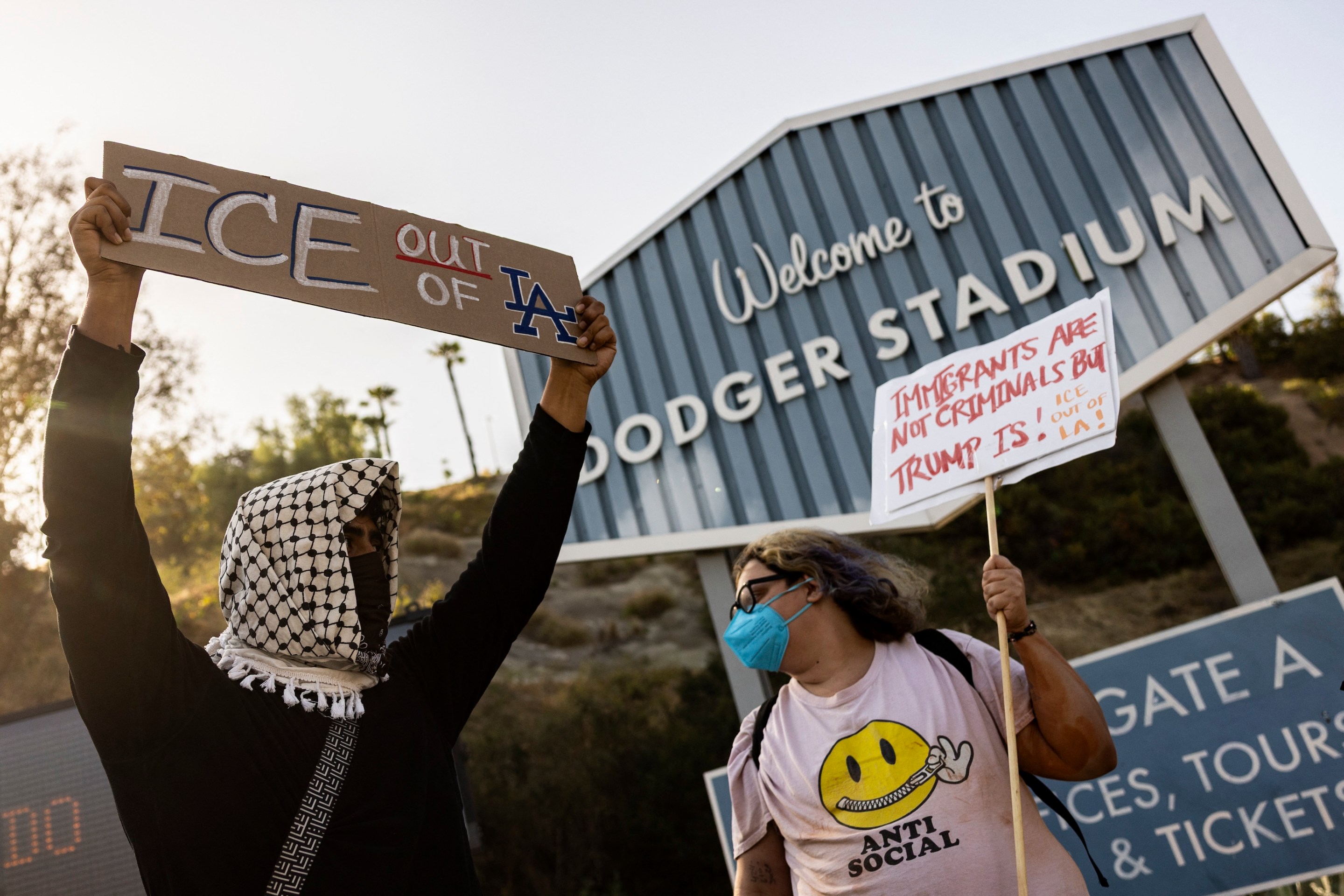It seemed like a small thing at the time. Before last Saturday's game between the Los Angeles Dodgers and San Francisco Giants at Dodger Stadium, the singer Nezza performed "The Star-Spangled Banner" in Spanish, even after being told not to by team representatives, in a symbolic protest against the jackbooted deportation raids being carried out around the country and in Los Angeles by faceless federal goons. It is the sort of cruelty that no human being can help but take sides on, but a baseball team is not a human being, and the Dodgers had pointedly declined to offer any comment on the crisis to that point, even as Angelenos' protests in the streets were repeatedly escalated to violence by heavy-handed policing.
"We're not going to comment," Dodgers executive vice president and chief marketing officer Lon Rosen said that same day. That was in response to questions from the Los Angeles Times about whether the team had anything to say to its fans, a community that the organization proudly boasts is 40 percent Latino, and therefore a disproportionate target of ICE raids. "We’re not going to comment on anything."
Sure, some members of the team spoke up. Kiké Hernández sent an Instagram message of support to residents of what he called a "City of Immigrants." Manager Dave Roberts said he hoped the Dodgers could "be a positive distraction for what people are going through." But from the team itself, which is proud to claim to represent Los Angeles and its residents when it comes time to take fans' money, there was only a conspicuous silence. But that's the thing about any policy as widespread and tyrannical as the Trump administration's assault on immigrants, which has given feds basically unlimited impunity to operate: Eventually it touches everyone. On Thursday morning, the same day the team was to announce its plans "for assistance to immigrant communities," it reached the gates of Dodger Stadium.
Around 8 a.m., a line of unmarked vans and SUVs attempted to enter the stadium parking lot. They were feds—they said as much, although as has been characteristic of this campaign there was no sure way to tell by looking. They wore no uniforms, displayed no badges or service logos, and covered their faces. In short, they looked and dressed like immigration officers have looked and dressed around the country as they perform deportation raids on terrified communities—like thugs, or kidnappers, or just criminals.
"This morning, ICE agents came to Dodger Stadium and requested permission to access the parking lots," the Dodgers said in a statement. "They were denied entry to the grounds by the organization."
It should be noted that they were not, or not entirely, ICE, but rather Customs and Border Protection agents—another enforcement organization under the Department of Homeland Security, with much of the same powers and purview. It's a distinction without a difference; they all act more or less the same. The agents themselves were not exactly forthcoming with their identities, they told an L.A. Times reporter only that they were "DHS."
Denied entrance, the line of vehicles relocated to another gate outside a closed parking lot, where they gathered before gradually dispersing. They had apparently intended to use Dodger Stadium's lot as a quiet place to process people arrested in early-morning raids, including a major one at a Home Depot in Hollywood that had targeted day laborers and street vendors. One activist showed the Times photos of vehicles that were present at both the Home Depot raid and at Dodger Stadium. That activist also told the Times that a CBP agent had told her why they sought the apparent isolation of a closed stadium parking lot.
“We bring the detainees here to process them and conduct our investigation without public interference,” the agent said, according to [Emily] Phillips, who wrote down his quote. “We can’t do it in the Home Depot parking lot because the public makes it dangerous.”
Angelenos made sure they couldn't do it at Dodger Stadium, either. After images of the feds at the stadium began spreading on social media, protestors showed up in an attempt to confront them.
The protestors were kept from the federal agents by LAPD. The feds eventually left as more protestors arrived over the course of the morning.
The Dodgers, in the wake of Thursday's showdown, announced they will delay announcing their community initiatives. "Because of the events earlier today, we continue to work with groups that were involved with our programs," Dodgers president Stan Kasten said. "But we are going to have to delay today's announcement while we firm up some more details. We'll get back to you soon with the timing."
If the exact form of Thursday's events wasn't predictable, the broad strokes absolutely were. This isn't the type of politics where neutrality can be maintained indefinitely. Any pro sports team will inevitably be entwined with its community, and this is especially true of the Dodgers, from the composition of their fanbase to their immigrant megastar to their stadium's very origins. They didn't ask to be involved, but neither did those Angelenos being targeted and terrorized by the government. Not an inch can be given.






